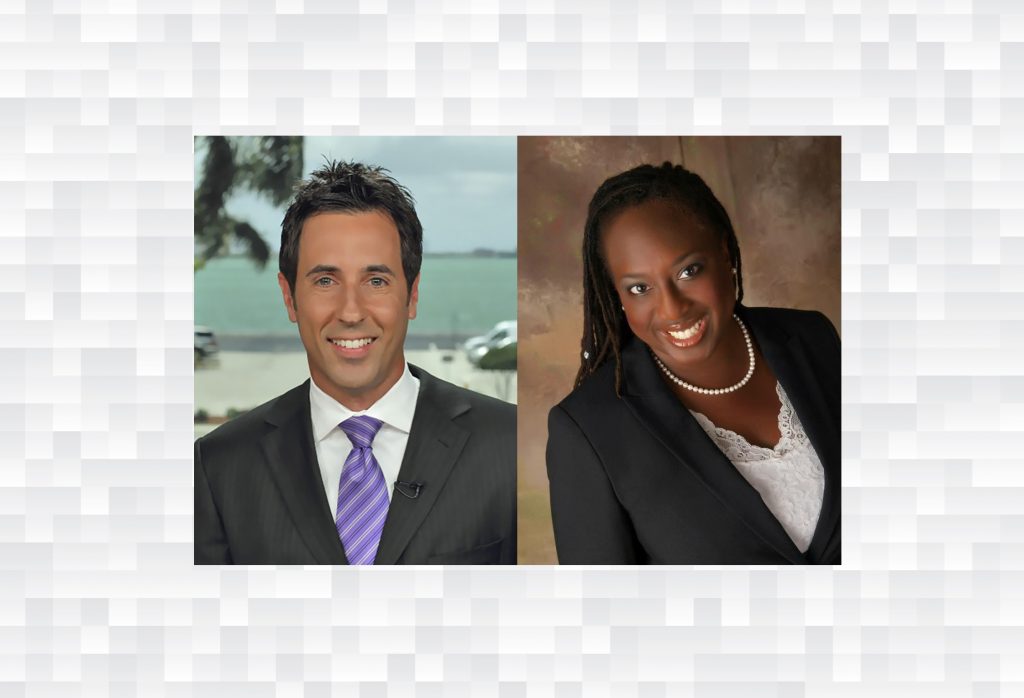Amendment 6 Bundles Judges' Retirement Age With Victims' Rights on Nov. 6 Ballot
According to Miami-based criminal defense lawyer Mark Eiglarsh and Melba Pearson, deputy director of the ACLU of Florida, voters should reject Amendment 6. Although the measure purports to extend the “rights of crime victims,” both Eiglarsh and Pearson say it will only undermine protections already enshrined in the Florida Constitution.
November 02, 2018 at 06:45 PM
6 minute read
 Mark Eiglarsh, with The Law Offices of Mark Eiglarsh, and Melba V. Pearson, deputy director of the American Civil Liberties Union of Florida. Courtesy photos.
Mark Eiglarsh, with The Law Offices of Mark Eiglarsh, and Melba V. Pearson, deputy director of the American Civil Liberties Union of Florida. Courtesy photos.
Miami lawyers have taken issue with a bundled amendment on the Florida ballot.
Along with a controversial proposal for victim's rights, Amendment 6 also contains language that would raise the mandatory retirement age for Florida judges from 70 to 75. It would also assign responsibility to judges for determining if state agencies correctly interpreted the law.
Some in the Miami legal community say the three issues, bundled by the Florida Constitution Revision Commission, are totally unrelated.
Among those taking notes is Melba Pearson, deputy director for the ACLU of Florida, who says the amendment places voters in an unenviable position.
“Voters are forced to pick between the lesser of three evils,” Pearson said. “In our opinion, that's completely wrong. Voters should be able to let their voices be heard on one topic.”
'Not Opposed' to Retirement Age Proposal
What's Inside Amendment 6
Pearson's opposition to the amendment is shared by Miami-based criminal defense attorney Mark Eiglarsh.
“I'm opposed to it overall because of how it may interfere with my client's rights, but I'm not opposed with raising the retirement age,” Eiglarsh said. “There are way too many phenomenal judges who are serving this community at 70. They shouldn't be forced to retire when they could still be of tremendous service to the community. As the average life expectancy increases, so should the age of retirement.”
Despite enthusiasm for separate parts of the amendment, both Pearson and Eiglarsh are opposed to it overall.
The victim's rights portion of Amendment 6 is the latest iteration in a spate of similar proposals to appear on state ballots in recent years. Modeled after the California Victims Bill Act of 2008, Amendment 6 is said to empower crime victims by enshrining their right to be heard at public trial. The proposal also contains language protecting victims from harassment and intimidation in addition to empowering them to demand speedy trials.
Pearson says the amendment is not only redundant to pre-existing protections in the Florida Constitution, but if passed, it would serve to create several legal headaches.
“The Florida Constitution in Article 1 provides victims three things. It provides them the right to be heard, the right to be informed and the right to be present at all stages of a criminal proceeding,” Pearson told the Daily Business Review, adding that Florida is ahead of most states with regards to legal protections for victims.
According to Pearson, who served as a Miami-Dade prosecutor for 16 years, the passage of Amendment 6 would erode pre-existing protections for those accused of a crime.
“There is already a provision in our constitution where it says victims have rights to the extent that it does not erode or infringe on the rights of the defendant,” she said. “That provision would be struck as part of Amendment 6.”
Eiglarsh echoed several of Pearson's fears.
“My greatest concern with Amendment 6 is that it would delete language from the Florida Constitution that currently guarantees that the constitutional rights of the accused shall not be interfered with,” he said. “While I have always been a staunch supporter of victim's rights, I don't believe it should ever be at the expense of the rights of the accused to obtain due process.”
State Attorney Endorsement
But proponents disagree. They argue that the amendment would enable victims to have a more active role in the legal process heretofore denied to them.
The amendment is known as Marsy's Law, named for victim's rights donor and advocate Henry Nicholas' sister who was murdered in 1983.
Among its high-level supporters is Miami-Dade State Attorney Katherine Fernandez Rundle, quoted in the Miami New Times as referring to the measure as “an opportunity for every Floridian to stand up to say that victims have rights and that they should be protected, they should be in our constitution.”
But both Pearson and Eiglarsh expressed reservations about the amendment's planned changes to the speed of court proceedings.
“The proposed amendment reduces the amount of time in which you can file an appeal postconviction,” Pearson said. “It reduces it to two years for a noncapital, nondeath penalty case and five years for a death penalty case.”
This could have significant fallout, according to Pearson.
“Florida leads the country in exonerations from death row,” she said. ”We've had 27 exonerations. The majority of those people would've been wrongfully executed if this amendment was in place. Exonerating evidence doesn't come out in year one. It comes out many years later. So if you cap it at five years you have someone who could be potentially wrongfully executed.”
Eiglarsh agreed the measure would leave defendants insufficient time to prepare for trial. And both litigators claim the amendment would add protections for corporations.
The official website for Amendment 6 lists Gov. Rick Scott, Attorney General Pam Bondi and gubernatorial candidate Ron DeSantis as supporters of the initiative.
Related stories:
Yes or No? What your Vote for 2 Broward County Charter Amendments Means
Election 2018: Here's a Roundup of Everyone Running for Judge in South Florida
This content has been archived. It is available through our partners, LexisNexis® and Bloomberg Law.
To view this content, please continue to their sites.
Not a Lexis Subscriber?
Subscribe Now
Not a Bloomberg Law Subscriber?
Subscribe Now
NOT FOR REPRINT
© 2025 ALM Global, LLC, All Rights Reserved. Request academic re-use from www.copyright.com. All other uses, submit a request to [email protected]. For more information visit Asset & Logo Licensing.
You Might Like
View All
Meta agrees to pay $25 million to settle lawsuit from Trump after Jan. 6 suspension
4 minute read
Executive Assistant, Alleging Pregnancy Discrimination and Retaliation, Sues Florida Healthcare Entrepreneur
3 minute read
Trending Stories
- 1Two More Victims Alleged in New Sean Combs Sex Trafficking Indictment
- 2Jackson Lewis Leaders Discuss Firms Innovator Efforts, From Prompt-a-Thons to Gen AI Pilots
- 3Trump's DOJ Files Lawsuit Seeking to Block $14B Tech Merger
- 4'No Retributive Actions,' Kash Patel Pledges if Confirmed to FBI
- 5Justice Department Sues to Block $14 Billion Juniper Buyout by Hewlett Packard Enterprise
Who Got The Work
J. Brugh Lower of Gibbons has entered an appearance for industrial equipment supplier Devco Corporation in a pending trademark infringement lawsuit. The suit, accusing the defendant of selling knock-off Graco products, was filed Dec. 18 in New Jersey District Court by Rivkin Radler on behalf of Graco Inc. and Graco Minnesota. The case, assigned to U.S. District Judge Zahid N. Quraishi, is 3:24-cv-11294, Graco Inc. et al v. Devco Corporation.
Who Got The Work
Rebecca Maller-Stein and Kent A. Yalowitz of Arnold & Porter Kaye Scholer have entered their appearances for Hanaco Venture Capital and its executives, Lior Prosor and David Frankel, in a pending securities lawsuit. The action, filed on Dec. 24 in New York Southern District Court by Zell, Aron & Co. on behalf of Goldeneye Advisors, accuses the defendants of negligently and fraudulently managing the plaintiff's $1 million investment. The case, assigned to U.S. District Judge Vernon S. Broderick, is 1:24-cv-09918, Goldeneye Advisors, LLC v. Hanaco Venture Capital, Ltd. et al.
Who Got The Work
Attorneys from A&O Shearman has stepped in as defense counsel for Toronto-Dominion Bank and other defendants in a pending securities class action. The suit, filed Dec. 11 in New York Southern District Court by Bleichmar Fonti & Auld, accuses the defendants of concealing the bank's 'pervasive' deficiencies in regards to its compliance with the Bank Secrecy Act and the quality of its anti-money laundering controls. The case, assigned to U.S. District Judge Arun Subramanian, is 1:24-cv-09445, Gonzalez v. The Toronto-Dominion Bank et al.
Who Got The Work
Crown Castle International, a Pennsylvania company providing shared communications infrastructure, has turned to Luke D. Wolf of Gordon Rees Scully Mansukhani to fend off a pending breach-of-contract lawsuit. The court action, filed Nov. 25 in Michigan Eastern District Court by Hooper Hathaway PC on behalf of The Town Residences LLC, accuses Crown Castle of failing to transfer approximately $30,000 in utility payments from T-Mobile in breach of a roof-top lease and assignment agreement. The case, assigned to U.S. District Judge Susan K. Declercq, is 2:24-cv-13131, The Town Residences LLC v. T-Mobile US, Inc. et al.
Who Got The Work
Wilfred P. Coronato and Daniel M. Schwartz of McCarter & English have stepped in as defense counsel to Electrolux Home Products Inc. in a pending product liability lawsuit. The court action, filed Nov. 26 in New York Eastern District Court by Poulos Lopiccolo PC and Nagel Rice LLP on behalf of David Stern, alleges that the defendant's refrigerators’ drawers and shelving repeatedly break and fall apart within months after purchase. The case, assigned to U.S. District Judge Joan M. Azrack, is 2:24-cv-08204, Stern v. Electrolux Home Products, Inc.
Featured Firms
Law Offices of Gary Martin Hays & Associates, P.C.
(470) 294-1674
Law Offices of Mark E. Salomone
(857) 444-6468
Smith & Hassler
(713) 739-1250







